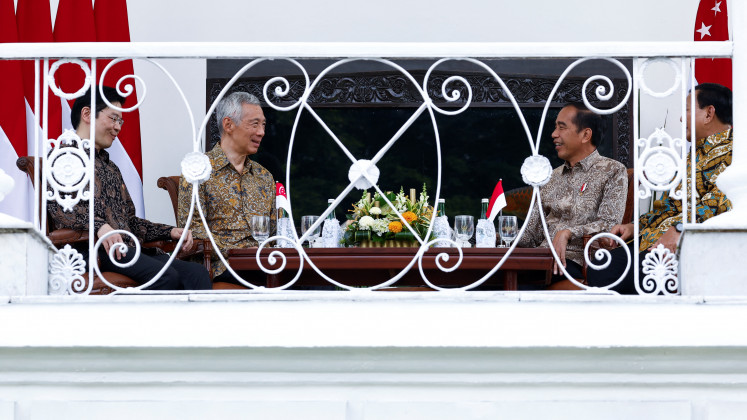Nudging legislative constraints in constitutional amendment
JP/Seto WardhanaIn heated debates on the already sinking quality of democracy in Indonesia, the issue of legislative power should be amplified as the House of Representatives essentially has more than enough clout to roll back the current political system
Change Size

JP/Seto Wardhana
In heated debates on the already sinking quality of democracy in Indonesia, the issue of legislative power should be amplified as the House of Representatives essentially has more than enough clout to roll back the current political system.
We were all astounded when a bill to revise the Corruption Eradication Commission (KPK) Law was passed. Similarly, the public was shocked when a number of controversial bills were about to be passed, though delayed.
But what was not realized all around was the fact that all the bills had been approved in their entirety by virtually all political parties, without any meaningful debate or contention among themselves.
This perfect concurrence reflects that internal accountability within the House hardly exists. It has been arduous to make politicians accountable during “normal” times.
Now without dissenting views over major issues, decent legal or policy output seems to be more difficult to acquire.
The timing of this concurrence could not be any better. The election is over and seats have been proportionally given to political parties according to their vote shares. The much-awaited “reconciliation” between the two opposing camps in the presidential race has also been carried out; thus, there might be no strong reason to listen to public concerns this time around.
On the so-called reconciliation, one would remember the urge for having a compromise between President Joko “Jokowi” Widodo and his then-rival Prabowo Subianto, to subside potential tensions at the grass roots, given that the election was over and the Constitutional Court had upheld Jokowi’s victory.
Nonetheless, in hindsight we now understand the true meaning of this reconciliation — to eliminate the opposition power and rule out any disagreements among political elites.
Today the People’s Consultative Assembly has clearly indicated its will to amend our Constitution. Bambang Soesatyo, its speaker, said it would revive the State Policy Guidelines (GBHN) for the upcoming administration. If this comes to materialize, Indonesia’s political system will undergo an abrupt change.
The revival of the GBHN will put the president under the Assembly. It will likely eliminate our direct presidential election, which will then be replaced by an indirect election by the Assembly. If that happens, the president and his Cabinet will be accountable to the House.
This change will also obscure the fact that Indonesia adheres to the presidential system. Under the presidential system, there is no such thing as a supreme body given that both the president and legislature are equally powerful and cannot topple each other.
Unlike the parliamentary system, one of the main peculiarities of the presidential system is the separation of power between the executive and legislative branches. The two must be independently split as they both earn different legitimacies through different elections.
If these two principles, the absence of a supreme body and the separation of power, are violated, then our presidential system no longer exists.
The problem is that our 2019-2024 legislature wields more power to thrust this constitutional amendment forward. All key prerequisites to amend the 1945 Constitution are under the control of the ruling political coalition.
Article 37 of the Constitution states that the proposed amendment should be submitted by at least one-third of assembly members — comprising 575 House members and 136 members of the Regional Representatives Council (DPD).
Now, if we count the total seats of the ruling Indonesian Democratic Party of Struggle (PDI-P) and the Golkar Party, the two drivers of this plan, we already get 30 percent of shares.
This is not to mention other parties such as the NasDem Party and the United Development Party (PPP), which seem to concur with this amendment.
Additionally, with the incoming support of the Gerindra Party and Prabowo, who has openly said that he is in favor of this change, the road to the fifth amendment is more likely to pave its own way.
Article 37 also explains the minimum requirement of approval from 50 percent plus one Assembly members to pass the amendment. Given current seat shares among parties in the House and the dynamics of the political coalition, clearly two or three main political parties only — PDI-P, Golkar and Gerindra — will be veto players that define the map of the game. The DPD’s power will be irrelevant. And other smaller political parties, even if they oppose this plan, will understand their limits.
In responding to this plan, President Jokowi has firmly said he rejected the amendment. Realizing the consequences of reinstating the GBHN, Jokowi argued that the current political system should be preserved.
He himself was the product of direct elections, starting his career as mayor from the mid-size city of Surakarta in Central Java, to Jakarta governor, before being elected president because of his popularity.
But Jokowi is not the leader of the PDI-P, his own party, and perhaps will lose his grip on his political coalition in the coming months. There have been instances in which the President has been on the opposing side of the PDI-P.
A case in point was the battle over the new KPK Law, wherein the President’s gesture to issue a regulation in lieu of law (Perppu) has met strong resistance from his party.
Jokowi can compensate for this shortcoming by shifting his focus on the public. He should be listening to people again and addressing much of their concerns to regain trust — something that seems to be declining in his presidency.
_____________________
Researcher at the Department of Politics and Social Change, Centre for Strategic and International Studies









